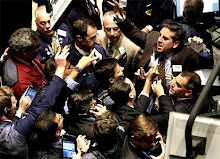Sunday, October 5, 2008
Complexity of the Situation- Part 2
Banks can't stop lending forever, that's how they make money....they take your money, pay you an interest rate on it, then lend it out at higher rates....they can not axe out the latter part of the equation indefinitely if they wish to remain in business over the long run....right now banks are just waiting out the storm just as we are to see which institutions are going to survive so they know which counter parties they can do business with confidently.....risk aversion is extremely high across the entire landscape of our financial ecosystem right now....no one wants to take on any risk whatsoever.....equities known as the best asset class to own over the long run are viewed as extremely risky, real estate is still working off excesses and prices have yet to find an official bottom, and treasury bonds the least risky asset of all are paying out yields at multi-decade lows.....however the aggregate effect of extreme risk aversion will prove to be a good thing over the long run, as over this period of time where the financial system is adjusting from one of very high risk tolerance to one of very low risk tolerance, those parties who have based their models on taking on high amounts of risk will inevitably cease to exist as risk-taking counterparties pull capital at very high velocities.....those models predicated on demand for risky assets will fall by the wayside while those models less reliant on the returns of high risk assets will be just fine......its funny how easily we forget that risky assets paying high yields do carry RISK....did wall street just completely forget about the idea of risk when investing in subprime mortgages....say it with me "SUB-PRIME".....NOT PRIME......NOT HIGH QUALITY....LOW QUALITY.....HIGH YIELD......HIGH RISK! these wall street bankers were not idiots....theyve been playing this game for decades knowing that anytime you have anything that pays a higher than average yield on an investment it means without doubt that you are taking on additional risk.....that is why you are being paid a higher than average return....to ASSUME THAT RISK! so first mistake made by wall street....taking on higher risk assets without some sort of hedge or idea that these risky assets might in fact prove to be risky assets and lead to higher than average losses.....where was this in the game plan? i cant find it anywhere....its like going into battle without any plan for possible missteps, miscalculations or even outright losing.....now mistake #2, and this is even bigger than mistake #1, LEVERAGING HIGH RISK ASSETS....how on earth can global institutions rationalize leveraging assets which payout high yields and are known to carry higher than average risk without any sort of assumption that this plan (now carrying even higher risk due to leverage!) may in fact not work as planned?? seriously i cant figure it out.....the only explanation i can think of is the idea of herd or mob mentality.....institutions looked around and saw every institution across the globe taking on these high yield high risk assets and said to themselves, look we know there are risk here, but first of all we cant just sit around while our competitors pull in higher than average returns....we'll look like losers....we need to compete.....second of all, if these assets dont work out, and all of our competitors are holding them as well, well lets face it the whole system cant come crumbling down.....can it? no....we hope not.....no way the Fed will save.....they have to they no choice.....this was the backstop!......this is the idea of mob mentality.....you no longer become a single individual but rather one small part of something much larger which allows individuals to take on actions without risk of individual failure knowing that in the end any sort of consequence will be divided out between a host of individuals possibly equating to consequences less than that of the consequence of a single individual action.....and moreover that if the entity accumulates enough individual participation to become larger in size and in power than that of the overseer of the system then there becomes the possibility that the entity can not be stopped and/or that there remains no FATHOMABLE OR REALISTIC consequence to any action carried out by the entity.....ie TOO BIG TO FAIL.
Subscribe to:
Post Comments (Atom)


No comments:
Post a Comment